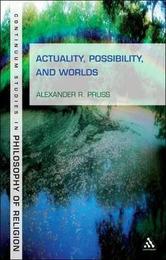
|
Actuality, Possibility, and Worlds
Paperback / softback
Main Details
Description
Actuality, Possibility and Worlds is an exploration of the Aristotelian account that sees possibilities as grounded in causal powers. On his way to that account, Pruss surveys a number of historical approaches and argues that logicist approaches to possibility are implausible. The notion of possible worlds appears to be useful for many purposes, such as the analysis of counterfactuals or elucidating the nature of propositions and properties. This usefulness of possible worlds makes for a second general question: Are there any possible worlds and, if so, what are they? Are they concrete universes as David Lewis thinks, Platonic abstracta as per Robert M. Adams and Alvin Plantinga, or maybe linguistic or mathematical constructs such as Heller thinks? Or is perhaps Leibniz right in thinking that possibilia are not on par with actualities and that abstracta can only exist in a mind, so that possible worlds are ideas in the mind of God?
Author Biography
Alexander R. Pruss is Associate Professor of Philosophy at Baylor University, TX, USA. He has PhDs in both Philosophy as well as Mathematics and is the author of The Principle of Sufficient Reason: A Reassessment (CUP, 2006) and co-editor, with Richard M. Gale, of The Existence of God (Ashgate, 2003).
Reviews"In this book Alexander Pruss cogently argues the merits of an Aristotelian account that takes possibilities to inhere in the causal power of things. His instructive and insightful approach will be of interest to anyone concerned with the metaphysics of modality." -- Nicholas Rescher, Distinguished University Professor of Philosophy, University of Pittsburgh, USA.
|